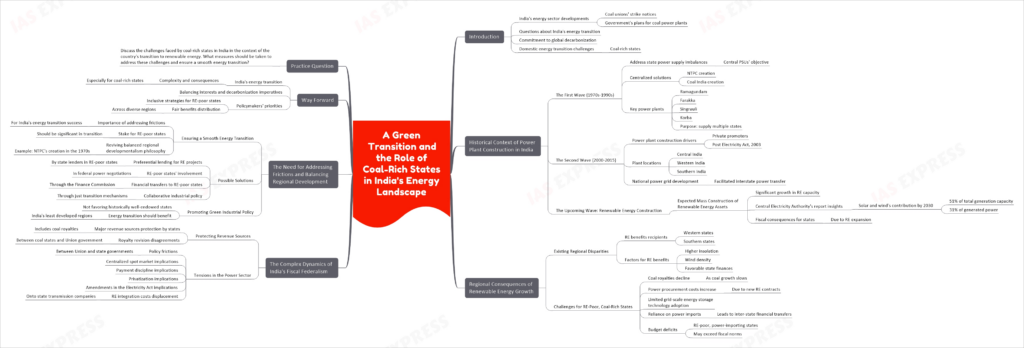A Green Transition and the Role of Coal-Rich States in India’s Energy Landscape
Recent developments in India’s energy sector, including coal unions’ strike notices and the government’s plans to build new coal power plants, have raised questions about the country’s energy transition. While India is committed to global decarbonization efforts, the domestic energy transition presents complex challenges, particularly for coal-rich states. This article explores the dynamics of India’s energy transition and the implications for states heavily dependent on coal revenue.
Historical Context of Power Plant Construction in India
The First Wave (1970s-1990s)
- Central PSUs aimed to address state power supply imbalances.
- NTPC and Coal India were created to provide centralized solutions.
- Key power plants like Ramagundam, Farakka, Singrauli, and Korba were strategically located to supply multiple states.
The Second Wave (2000-2015)
- Private promoters drove power plant construction after the Electricity Act, 2003.
- Plants were mainly located in central, western, and southern India.
- Development of a national power grid facilitated interstate power transfer.
The Upcoming Wave: Renewable Energy Construction
Expected Mass Construction of Renewable Energy Assets
- Projections indicate significant growth in renewable energy (RE) capacity.
- Central Electricity Authority’s report predicts solar and wind to account for 51% of total generation capacity and 31% of generated power by 2030.
- Potential fiscal consequences for states due to RE expansion.
Regional Consequences of Renewable Energy Growth
Existing Regional Disparities
- Most RE benefits have accrued to western and southern states.
- Factors include higher insolation, wind density, and favorable state finances.
Challenges for RE-Poor, Coal-Rich States
- Decline in coal royalties as coal growth slows.
- Increased power procurement costs due to new RE contracts.
- Limited adoption of grid-scale energy storage technologies.
- Greater reliance on power imports, leading to inter-state financial transfers.
- Budget deficits in RE-poor, power-importing states may exceed fiscal norms.
The Complex Dynamics of India’s Fiscal Federalism
Protecting Revenue Sources
- States guard their major revenue sources, including coal royalties.
- Disagreements between coal states and the Union government over royalty revisions.
Tensions in the Power Sector
- Policy friction between Union and state governments.
- Centralized spot market, payment discipline, privatisation, and amendments in the Electricity Act.
- Displacement of RE integration costs onto state transmission companies.
The Need for Addressing Frictions and Balancing Regional Development
Ensuring a Smooth Energy Transition
- Addressing emerging frictions is crucial to India’s energy transition success.
- RE-poor states should have a significant stake in the transition.
- Reviving the philosophy of balanced regional developmentalism, as seen with NTPC’s creation in the 1970s.
Possible Solutions
- Preferential lending for RE projects in RE-poor states by state lenders.
- Greater involvement of RE-poor states in federal power negotiations.
- Explicit financial transfers to RE-poor states through the Finance Commission.
- Collaborative industrial policy through just transition mechanisms.
Promoting Green Industrial Policy
- Green industrial policy should not favor historically well-endowed states.
- Ensuring that the energy transition benefits India’s least developed regions.
Way Forward
India’s energy transition is a complex process with far-reaching consequences for coal-rich states. Balancing the interests of these states with the imperatives of decarbonization is essential for a successful transition. Policymakers should prioritize inclusive strategies that empower RE-poor states and ensure a fair distribution of benefits across the nation’s diverse regions.
Practice Question for Mains
Discuss the challenges faced by coal-rich states in India in the context of the country’s transition to renewable energy. What measures should be taken to address these challenges and ensure a smooth energy transition?
If you like this post, please share your feedback in the comments section below so that we will upload more posts like this.

